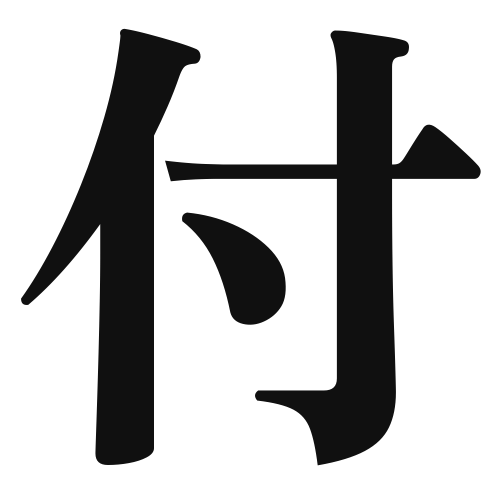1. Overview of Meaning
The kanji “付” (pronounced “fu” or “tsu”) generally means “to attach,” “to add,” or “to provide.” It conveys the idea of connecting or associating something with another thing.
2. Formation and Radical
Formation of the Kanji: The kanji “付” is a phono-semantic compound (形声文字), which means it combines a phonetic component with a semantic component. The left part “付” suggests the meaning related to attachment, while the right part indicates the pronunciation.
Radical: The radical for “付” is “付” itself, which is often associated with actions of attaching or adding.
3. Examples of Usage
Common Words and Phrases: Some frequently used words that include “付” are:
- 付属 (ふぞく, fuzoku) – “attached” or “affiliated”
- 付ける (つける, tsukeru) – “to attach” or “to add”
- 料金付 (りょうきんつき, ryokin tsuki) – “including fees”
Example Sentences in Daily Conversation:
- この書類にサインを付けてください。 (このしょるいにサインをつけてください。) – “Please attach your signature to this document.”
- 彼は新しいプロジェクトに付属の資料を送った。 (かれはあたらしいプロジェクトにふぞくのしりょうをおくった。) – “He sent the attached materials for the new project.”
4. Synonyms and Antonyms
Similar Kanji: A similar kanji is “添” (てん, ten), which also means “to attach” but often implies a more supportive or supplementary action.
Antonyms: An antonym for “付” could be “離” (はな, hana), which means “to separate” or “to detach.”
5. Cultural and Historical Background
Relation to Japanese Culture: The concept of “付” is significant in Japanese culture, especially in contexts where relationships and connections are valued, such as in business and social interactions.
Proverbs and Idioms: One common idiom is “付和雷同” (ふわらいどう, fuwaraidou), which means “to follow blindly” or “to conform without thinking.” This reflects the importance of critical thinking and individuality in Japanese society.
